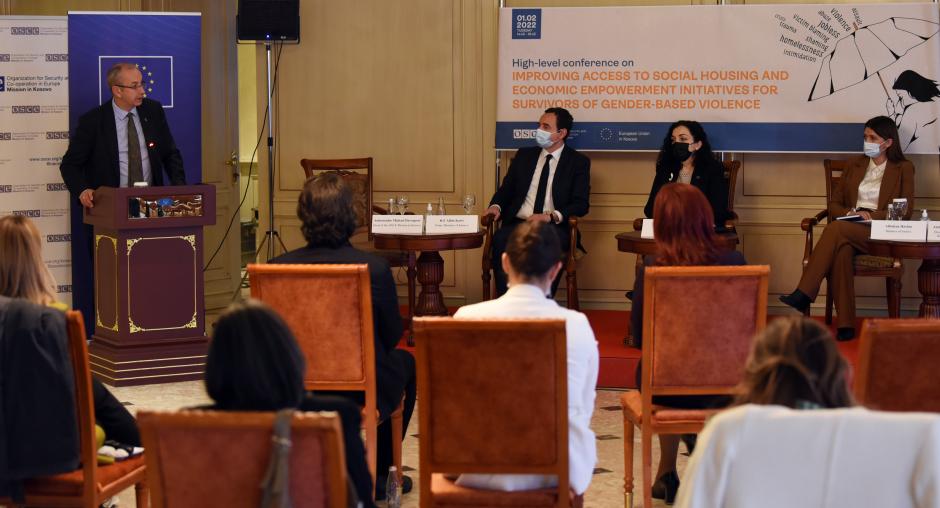Jobs, social housing essential for ending domestic violence cycle in Kosovo, high-level OSCE-EU conference concludes

PRISHTINË/PRIŠTINA, 1 February 2022 - Without economic empowerment and housing alternatives, domestic violence victims will be discouraged from reporting cases. Even when they do, they will be forced to go back to the perpetrator, making it essential to find sustainable solutions. This was the main conclusion from today’s high-level conference organized by the OSCE Mission in Kosovo with the support of the European Union Special Representative/EU Office in Kosovo.
The event, which gathered senior officials from government and local level institutions, looked into best practices and ways to find long-term solutions for these victims by providing affordable housing and employment opportunities.
“A society will be safe only when women will feel safe, in the street, at work and in their homes. We, the institutions, need to offer and guarantee them this safety. There is no better protection for victims of domestic violence than their financial independence,” said President Vjosa Osmani-Sadriu.
“With Kosovo’s programme for gender equality 2020-2024, first strategic objective is creation of equal opportunities for women and men, so that women can contribute but also benefit from the economic development, and we increase their inclusion, but also their active participation,” said Prime Minister Albin Kurti.
In his opening remarks, Ambassador Michael Davenport, said: “The economic empowerment of women is crucial if we are to eliminate gender discrimination including gender-based violence against women and girls. Supporting gender-based victims and upholding their economic, property and inheritance rights is the only way to enable them to leave abusive relationships. And ultimately to save their – and their children’s - lives. Backing empowerment and reintegration is a duty for all of us, requiring effective inter-agency co-operation and a whole-of-society response.”
Panels of experts attending the conference elaborated on the existing legal and policy framework for the economic empowerment of gender-based violence survivors, challenges and how those could be addressed by the new legal instruments that are currently being developed, namely the new draft law on protection against domestic violence. They also discussed best practices, with a special emphasis on the importance of access to social housing.
“Affordable housing is essential for the reintegration of the victims of violence into the society. Other economic empowerment initiatives are also required: financial incentives for businesses led by women or that employ women survivors, job subsidies and employment in public institutions are also good tools. I encourage the newly elected mayors to raise this issue in their political agendas. It is important to take women victims of violence into account at the time of designing housing, employment, business development or vocational training policies,” said the EUSR, Ambassador Tomáš Szunyog.
The conference built on previous work by the OSCE Mission and the EUSR/EU Office in Kosovo in supporting first contact service providers for victims of domestic violence; advising policy-makers on ‘victim-centred’ legislation in line with international standards; and empowering women from all communities to access education and the labour market.
